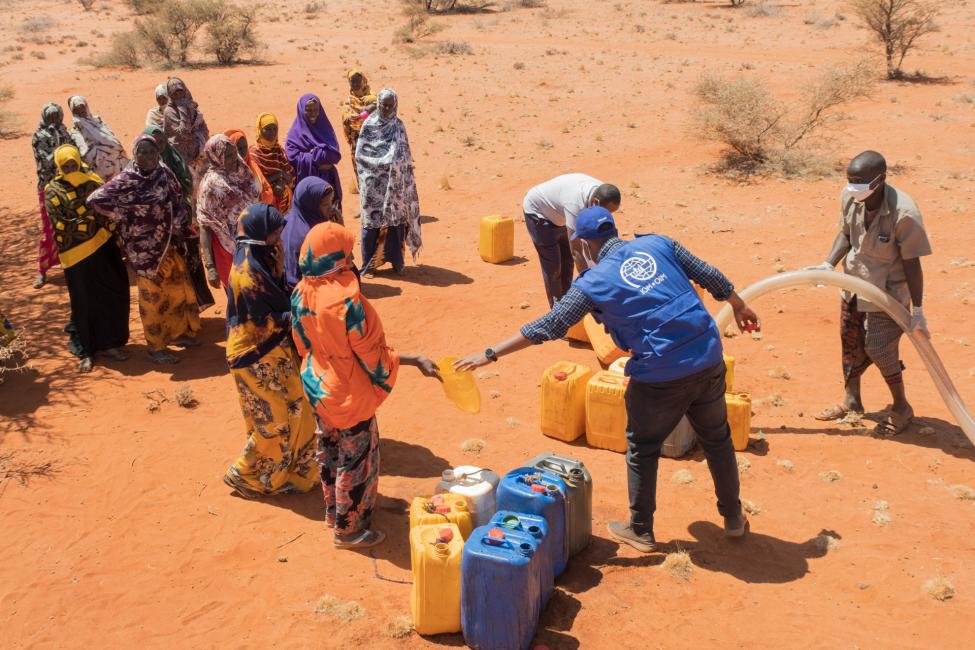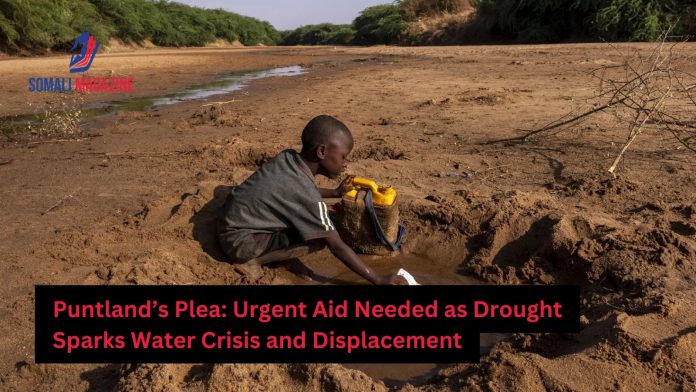Facebook Twitter Instagram Somali Magazine - People's Magazine
Puntland regional government has issued an urgent call for humanitarian assistance as a worsening drought triggers severe water shortages, mass displacement, and escalating health risks across northeastern Somalia. The crisis, fueled by prolonged dry spells and failed seasonal rains, is threatening the lives and livelihoods of thousands, particularly vulnerable populations such as pastoralist families, women, and children.
In an appeal released on April 8, 2025, Puntland’s Minister of Humanitarian Affairs and Disaster Management, Ubah Abdirashid Mohamed, highlighted the dire conditions in regions including Nugal, Mudug, Bari, and Sanaag. Field assessments conducted by local authorities revealed that critical water sources, such as shallow wells and boreholes, have dried up, leaving communities without access to safe drinking water. “Communities are traveling long distances in search of water for human and livestock consumption,” Mohamed stated. “This increases the risk of displacement, waterborne diseases, and intercommunal tensions over shrinking resources.”
The drought has devastated pastoralist families, who rely heavily on livestock for their survival. Rising livestock deaths and deteriorating pasture quality have compounded the crisis, pushing families deeper into poverty and food insecurity. Health officials warn that malnutrition levels are surging, particularly among children, with many at risk of stunting and other long-term health consequences. Pregnant and nursing mothers are also facing heightened vulnerability as clean water and food supplies dwindle.
Puntland’s government has called on humanitarian agencies to scale up emergency interventions, including water trucking services, the repair and rehabilitation of strategic water points, and the distribution of water purification supplies. Integrated water, sanitation, and hygiene (WASH) programs are urgently needed to address the crisis and prevent further deterioration. “Time is of the essence to avert a humanitarian catastrophe,” Mohamed emphasized.
The appeal comes as Somalia grapples with the long-term impacts of climate change, recurring droughts, and armed conflict. Aid agencies warn that without immediate international support, the current crisis in Puntland could escalate into a wider humanitarian emergency. Puntland’s government has also urged the federal government and international partners to prioritize drought response efforts and provide the necessary resources to mitigate the crisis.

The Puntland Land and Water Data Agency (IMAC) has reported delayed and below-average spring rainfall, further exacerbating the drought. The much-anticipated Gu rains, which typically replenish water sources and support agricultural and pastoral livelihoods, have yet to arrive. IMAC predicts that the rains may begin after April 10 but warns they will be insufficient to address the region’s growing needs. “This delay and reduction in rainfall is a red flag,” the agency stated. “We are on the cusp of a drought, and water shortages are imminent.”
The drought has also led to mass displacement, with families abandoning their villages in search of water and food. Local officials have described scenes of desperation, with communities struggling to survive amid dwindling resources. In Bari region, for example, 30 percent of livestock have reportedly died, and the remaining animals are in poor condition. Villages have been left deserted as residents move to urban centers and relief camps.
Humanitarian organizations have called for coordinated action to address the crisis and support affected populations. Environmental analysts warn that erratic weather patterns driven by climate change are likely to worsen, underscoring the need for long-term resilience measures. Puntland’s government has pledged to work with local NGOs and international partners to implement a comprehensive drought response plan, but limited resources remain a significant challenge.
As Puntland braces for what could become a severe humanitarian crisis, the focus remains on mobilizing aid and addressing the root causes of vulnerability. The urgent appeal serves as a stark reminder of the devastating impact of climate change and the importance of global solidarity in supporting communities at risk.

